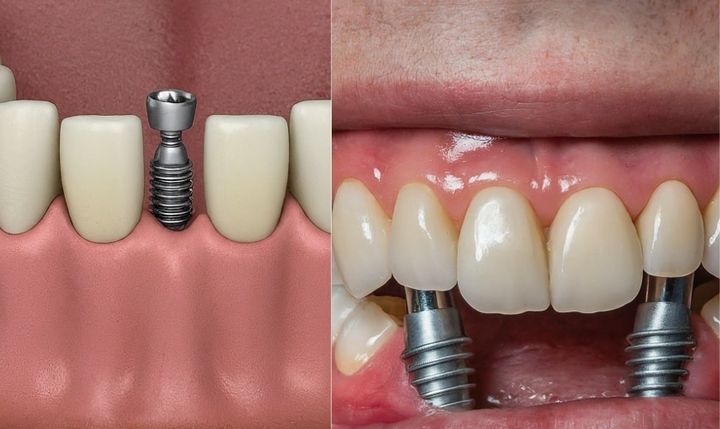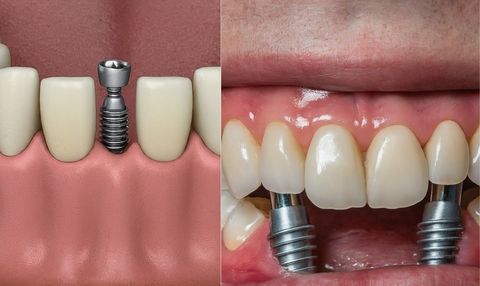
Dental Implants Explained: Everything You Need to Know
A dental implant is a sophisticated medical device used to replace a missing tooth or teeth. It consists of a small, screw-shaped post, typically made of titanium, that is surgically placed into the jawbone where the tooth root once was.
Why Dental Implants Are So Important

Dental implants have revolutionized restorative dentistry. Beyond simply filling a gap, they offer a range of significant benefits that improve both oral health and overall quality of life.
Who It Affects
Individuals with Missing Teeth: Anyone who has lost a single tooth, multiple teeth, or all their teeth due to injury, decay, or disease is a potential candidate.
Denture Wearers: People who struggle with the discomfort, instability, or inconvenience of removable dentures can find a more permanent and comfortable solution with implants.
Patients with Jawbone Loss: Implants are a crucial treatment for preventing further bone deterioration and maintaining the structural integrity of the jaw and face.
Those Seeking a Long-Term Solution: Unlike bridges that may need replacement over time, dental implants are designed to be a permanent solution that can last a lifetime with proper care.
Problems It Solves
Restoring Functionality: Dental implants restore the ability to chew and speak with confidence. Because they are securely fused to the jawbone, they feel and function like natural teeth, allowing for the consumption of a wide variety of foods.
Preventing Jawbone Deterioration: One of the most critical benefits is their ability to stimulate the jawbone. This stimulation prevents the natural process of bone resorption (loss) that occurs when a tooth root is missing, helping to maintain facial structure and prevent a sunken, aged appearance.
Preserving Adjacent Teeth: Unlike a traditional bridge, which requires the filing down of adjacent healthy teeth for support, a dental implant stands on its own. This preserves the health and integrity of your surrounding natural teeth.
Enhancing Aesthetics and Self-Confidence: A dental implant and its custom-made crown are designed to look and feel exactly like a natural tooth. This not only improves the aesthetics of your smile but also boosts self-confidence in social and professional settings.
Durability and Comfort: Implants are a fixed, permanent solution. There is no risk of them slipping, shifting, or causing gum irritation, which are common complaints with removable dentures.
Recent Updates and Innovations
The field of dental implantology is constantly advancing, driven by new technologies and a focus on improving patient outcomes. In the last year, several key trends have reshaped the practice of implant dentistry.
Advanced Digital Workflow: The integration of digital technology has made the implant process faster, more precise, and more predictable than ever before. Dentists now use Cone Beam Computed Tomography (CBCT) scans to create highly detailed 3D images of a patient's jawbone. This data, combined with sophisticated planning software, allows the dentist to virtually plan the exact location, angle, and depth of the implant before surgery. This digital approach minimizes human error and reduces risks.
The Rise of AI-Powered Planning: Artificial intelligence (AI) is playing a game-changing role. In 2025, AI algorithms are being used to analyze patient scans, recommending optimal implant size and location, and even simulating healing timelines. This AI-assisted approach streamlines the pre-surgical planning phase, providing data-driven insights that can significantly increase the success rate of the procedure.
Zirconia Implants as a Titanium Alternative: While titanium remains the gold standard, zirconia implants are gaining popularity. This ceramic-based material is ideal for patients with metal allergies and offers superior aesthetics, as its white color more closely mimics a natural tooth. New research from mid-2025 shows that new zirconia surface treatments are improving osseointegration, the process where the implant fuses with the jawbone.
Immediate Load Implants: For eligible patients, a technique known as "immediate loading" or "Teeth-in-a-Day" is now more common. This allows for the placement of a temporary crown or denture on the same day as the implant surgery. While a healing period is still required for the final restoration, this advancement provides immediate aesthetic and functional benefits.
Laws, Policies, and Regulations
The safety and quality of dental implants are strictly regulated by government bodies to ensure patient protection. These regulations oversee the entire lifecycle of a dental device, from its manufacturing to its use in a clinical setting.
Global Regulatory Oversight: In the United States, the Food and Drug Administration (FDA) classifies dental implants as medical devices and subjects them to rigorous testing and approval processes. Similarly, the European Medicines Agency (EMA) ensures that all devices sold in the EU meet stringent health and safety standards. These bodies regularly update their guidelines to address new materials and technologies, ensuring that only safe and effective products are available to the public. For instance, in May 2025, the FDA introduced new rules for medical device labeling, requiring more comprehensive disclosure of materials and stricter testing protocols to ensure biocompatibility.
Regulations in India: In India, the Central Drugs Standard Control Organisation (CDSCO) regulates dental devices under the Medical Devices Rules, 2017. Dental implants fall under Class C and D, which have higher risk levels and therefore require stricter approval processes, including a comprehensive license to manufacture or import. The CDSCO maintains a database of approved devices, ensuring that practitioners use only verified and safe products. Regular audits and a mandate for local clinical data are designed to ensure that the devices are both safe and effective for the Indian population.
Professional Standards: In addition to device regulations, a practitioner must be licensed and trained to perform implant surgery. Professional bodies, such as the Indian Dental Association (IDA), set standards for professional conduct, continuing education, and patient care, ensuring that only qualified and experienced dentists perform these procedures.
Tools and Resources
For individuals considering dental implants, a variety of helpful tools and resources are available to provide information and assist with the decision-making process.
Patient Education Websites: Websites from professional organizations like the American Academy of Implant Dentistry and the Indian Dental Association offer reliable, unbiased information on the procedure, its benefits, and potential risks.
Find-a-Dentist Services: Many dental association websites and platforms provide directories that allow you to search for qualified and experienced implant dentists in your area.
Cost Calculators: While only a dentist can provide an exact quote, many websites offer a free cost calculator to help you get a rough estimate of the total cost. These tools take into account factors like the number of implants needed, the type of material, and any additional procedures required.
3D Smile Visualizers: Some dental clinics use software that can take a 3D scan of your mouth and generate a digital preview of what your new smile will look like with dental implants. This can be a great way to visualize the potential aesthetic outcome of the treatment.
Blogs and Forums: Patient forums and blogs provide a platform for people to share their personal experiences with dental implants. While these are not a substitute for professional medical advice, they can offer valuable insights into the patient journey.
Frequently Asked Questions
Are dental implants painful?
The implant surgery is performed under local anesthesia, so you will not feel any pain during the procedure. Afterward, some discomfort, similar to a tooth extraction, is common. This can usually be managed with over-the-counter pain medication.
How long do dental implants last?
With proper oral hygiene and regular dental check-ups, the implant post itself can last a lifetime. The crown or prosthetic tooth, which is subjected to chewing forces, may need to be replaced after 10 to 15 years, though it can last much longer.
How much do dental implants cost?
The cost of a dental implant varies widely depending on several factors, including the number of implants, the material used, the need for additional procedures like bone grafting, and the dentist's fees and location. It's essential to get a detailed consultation and a clear treatment plan from a qualified professional.
Who is a good candidate for dental implants?
A good candidate is anyone who has one or more missing teeth and has sufficient jawbone to support the implant. They should also have good overall health and a commitment to maintaining good oral hygiene. Certain medical conditions and habits like smoking, can affect eligibility.
How do I care for my dental implants?
Caring for a dental implant is similar to caring for your natural teeth. You should brush twice a day, floss daily, and visit your dentist for regular check-ups and professional cleanings. Regular maintenance is key to the long-term success of the implant.
Conclusion
Dental implants have evolved from a specialized treatment into a mainstream solution for tooth loss, offering a path to restored function, aesthetics, and confidence. Backed by decades of research and continuous technological advancements, they stand as a testament to the power of modern dentistry. By providing a permanent, durable, and comfortable alternative to traditional prosthetics, dental implants are not just replacing teeth; they are transforming lives. They empower individuals to eat, speak, and smile with ease, proving to be a wise and lasting investment in both oral health and overall well-being.






